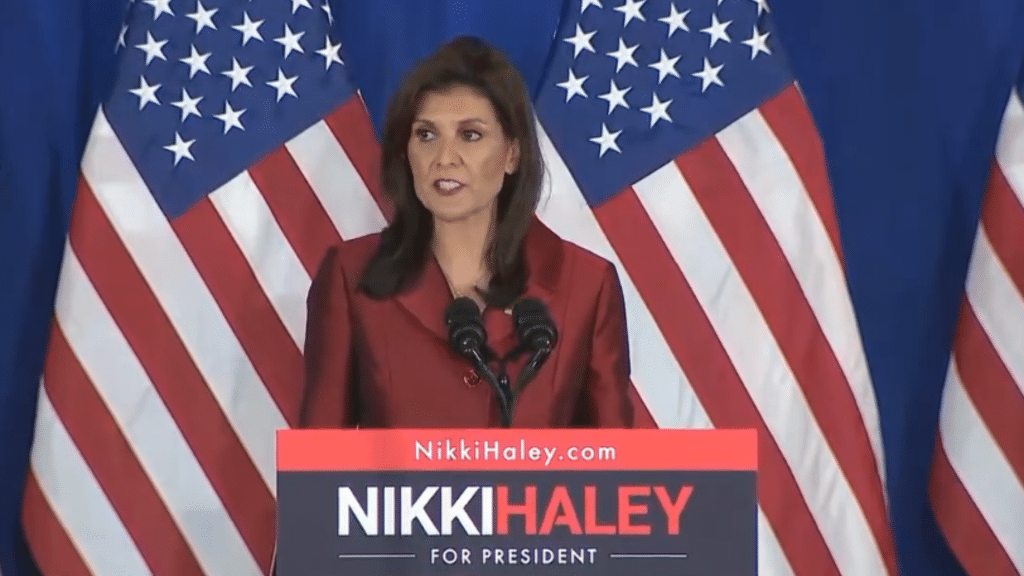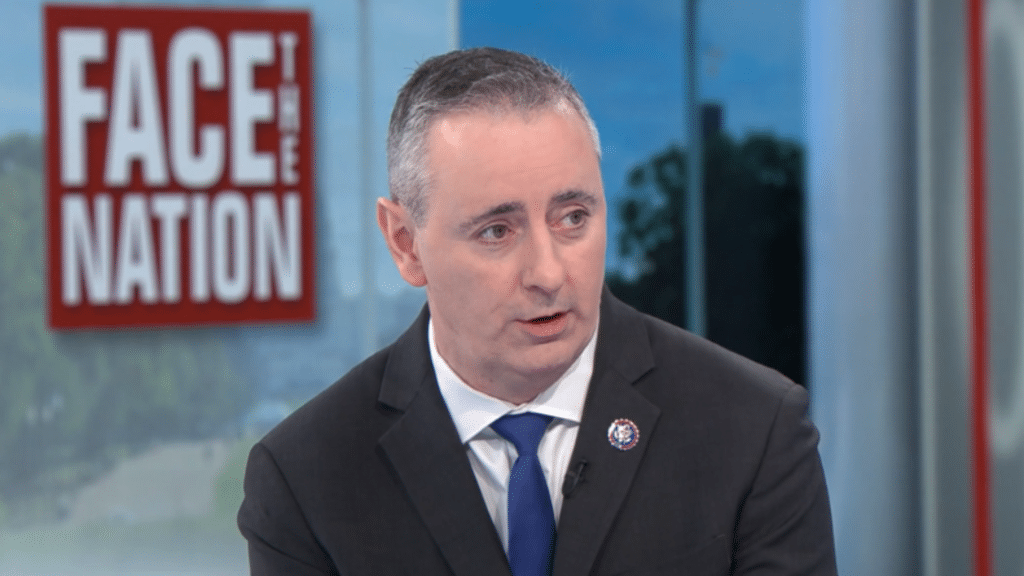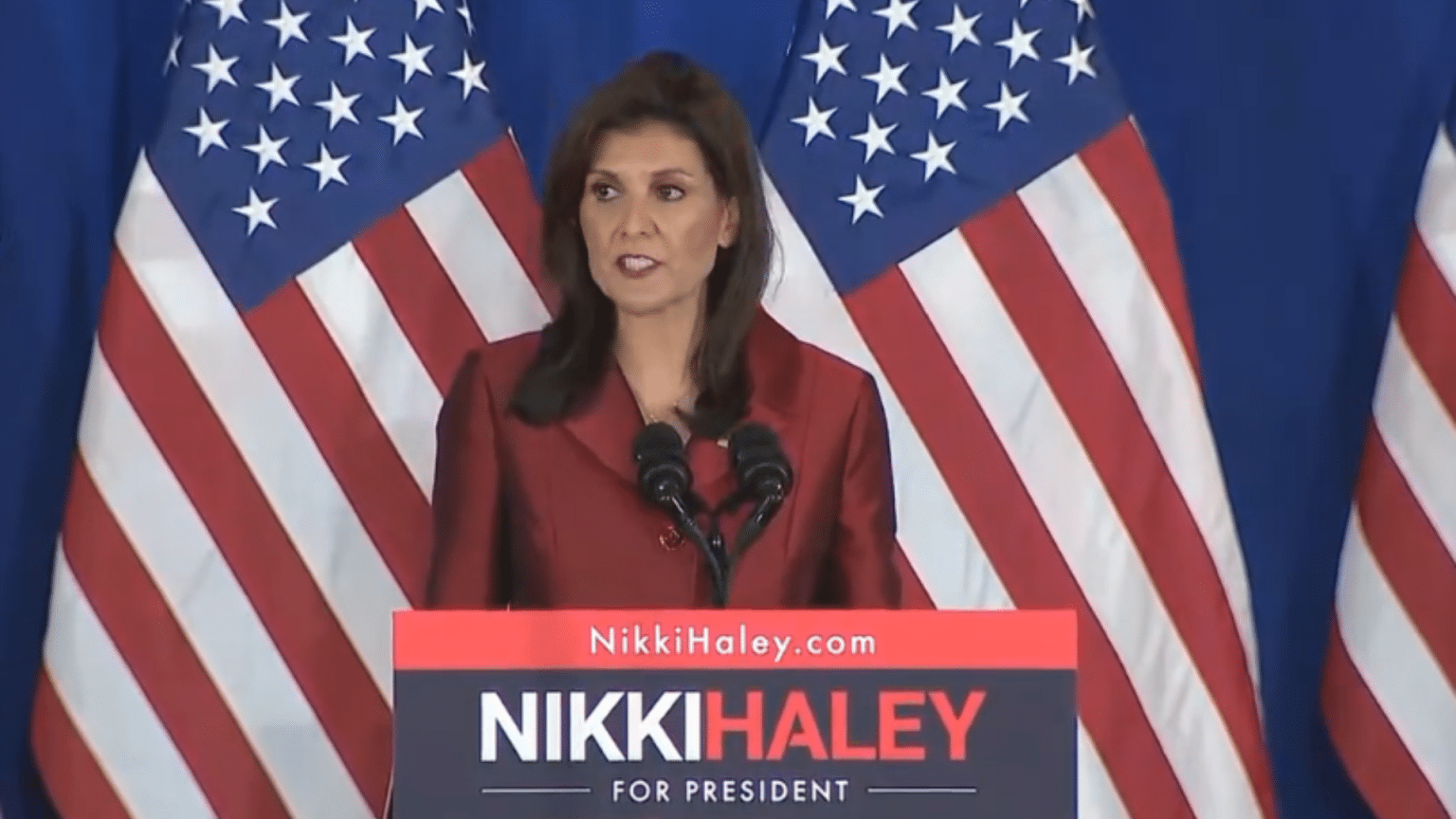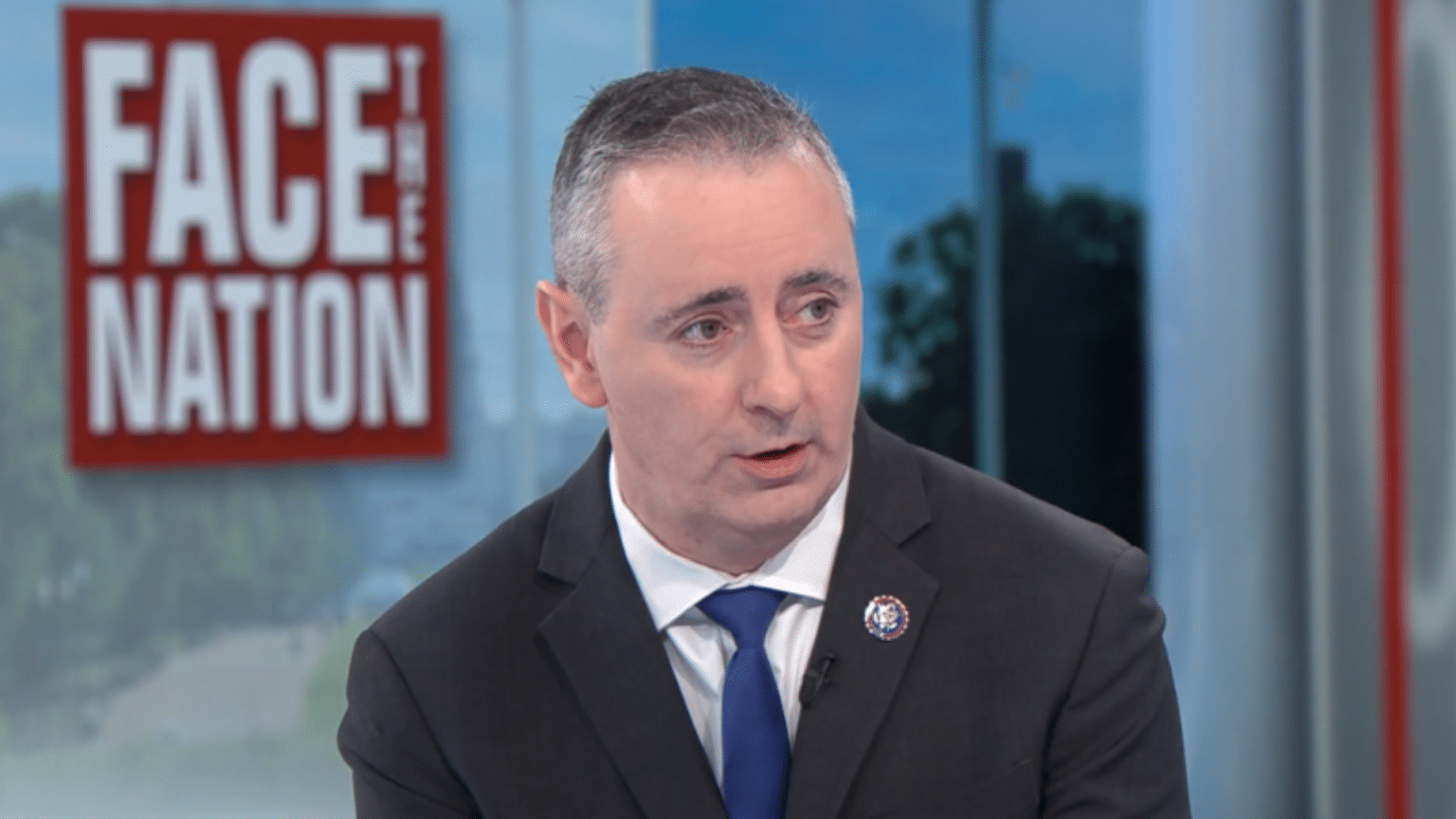February 28, 2024
Permission to republish original opeds and cartoons granted.
Haley’s Second Place Win in South Carolina is a Testament to How Far the Swamp Will Go to Stop Trump
|
|
Haley’s Second Place Win in South Carolina is a Testament to How Far the Swamp Will Go to Stop Trump

By Bill Wilson
Former South Carolina Republican Gov. Nikki Haley’s crushing loss in South Carolina on Saturday all but erased her chances of becoming the Republican nominee for president after she came in 20 points below former President Trump and lost Republicans by a resounding 40 points. Haley earned just 39.5% to Trump’s 59.8% in the important early-primary state, making her nomination for president untenable by most estimates.
However, what can be gleaned from Haley’s second-place position in her home state is just how concerted of an effort The Swamp is making to thwart a second Trump presidency. South Carolina allows independents – and Democrats – to participate in the GOP primary and participate they did. Exit polls reveal Haley’s modest showing in South Carolina is largely due to outside influence, not a “split” among conservatives as some media outlets would like to imply.
Republicans and conservatives were largely united around former President Trump on Saturday and his focus on America First priorities, including securing the southern border and strengthening the economy, were top priorities to voters.
Trump beat Haley among Republicans by 40 points – 70% to 30% - and he won 84% of very conservative voters, 72% of non-college voters, and 71% of white evangelicals according to NBC News exit polls.
Voters largely prioritized America First issues where Trump has drawn a sharp distinction between his philosophy and that of RINOs and globalists. Immigration and the economy were the top issues to South Carolina voters Saturday, and Trump dominated among voters who prioritized both issues. Trump won 80% of voters who said immigration was their number one issue to Haley’s 20%, and he won 62% of voters who said the economy was their number one issue to Haley’s 38%.
It is reasonable to speculate that Democrat participation in the GOP primary this year may have been substantially higher than it was eight years ago (the South Carolina primary was cancelled in 2020) based on a number of metrics, and that Haley’s relatively robust number of votes was buoyed by forces outside the conservative movement.
Just 68% of the votes cast in Saturday’s GOP primary came from self-identified Republicans according to NBC News exit polls, and Trump won their vote, again, by a resounding 40 points – 70% to 30%. The remaining 32% of the electorate was comprised of non-Republicans, with NBC News estimating around 22% were independents, which would mean around 10% were Democrats or non-affiliated voters.
Non-Republican voters largely formed Haley’s base, with Haley winning the 22% of the electorate who identified as independents by 25 points. She also won an overwhelming majority of voters who self-identified as moderate or liberal, securing 74% of their vote to Trump’s 25%.
We also know that participation in the Democratic primary in South Carolina earlier this month on Feb. 3 was significantly lower than it was in 2020, which could have impacted the Republican primary last Saturday. Registered Democrats who chose to sit out their own primary were eligible to vote in the Republican primary, and its appears that a certain number of Democrats may have “saved” their votes in order to vote in the GOP primary and support Haley over Trump.
In the Democratic primary on Feb. 3, Biden won a mere 126,336 votes compared to turning out over twice as many votes – 262,336 – in 2020. Trump won a total of 451,905 votes in the GOP primary last Sunday, but Haley emerged with 298,674 votes, and most of those votes did not come from Republicans according to exit polls.
The only logical conclusion is that Democrat interference was behind Haley’s close to 300,000 votes, yet even with a concerted effort to displace Trump, she lost resoundingly.
In fact, as NBC News reported last week, a pro-Haley super PAC was caught urging Democrats who didn’t vote in the Democratic primary on Feb. 3 to vote in the GOP primary Saturday. A mailer, sent out by FA Fund Inc., read, “Time is running out. You have a choice. Vote for Nikki Haley against Donald Trump”. This is a crystal-clear call to action for Democrats who couldn’t be bothered to vote for Joe Biden to interfere in the GOP primary and block Trump.
Haley is insisting on staying in the race even after her crushing loss in her home state, but the evidence is clear that she is buoyed by interests outside the conservative movement. Conservatives strongly favor Trump’s America First priorities, and Haley is being propelled forward by the political elite who will spare no cost in thwarting Trump.
As a tool of the Never Trump cabal, Haley needs to tread carefully. Once she no longer holds value as an opposition-piece for those propping up the status quo, she can depend on being abandoned. It will not be long before those forces abandon her altogether and move on to their next scheme to derail Trump.
Bill Wilson is the former president of Americans for Limited Government.
To view online: https://dailytorch.com/2024/02/haleys-second-place-win-in-south-carolina-is-a-testament-to-how-far-the-swamp-will-go-to-stop-trump/
Ukraine First: House GOP rebels expedite discharge petition to move foreign aid bill before securing border or funding U.S. government

By Robert Romano
House Republican rebels led by U.S. Rep. Brian Fitzpatrick (R-Pa.) are openly discussing joining with House Democrats to sign a discharge petition to move a $90 billion foreign aid bill to the floor of the House that includes $60 billion for Ukraine before anything has been done to secure the catastrophic southern border and even before federal government funding runs out in spurts on March 1 and March 8.
Appearing on CBS’ Face The Nation on Feb. 25, Fitzpatrick outlined the maneuver to bring the Ukraine funding bill to the floor for “expedited consideration”: “We have a bipartisan bill. It's the only one in the House. And as of Friday, we have filed with the clerk, expedited consideration. Normally, any kind of discharge like that would take 30 days to be considered right, we figured out a way with a parliamentarian to expedite that to a seven-day period.”
That was on Feb. 23, meaning the filed discharge petition for the foreign aid package could collect signatures and get to the floor as soon as March 1, provided it gets the required 218 signatures. Fitzpatrick would need to wrangle at least five other House Republicans and all 212 House Democrats to bring the measure up without the approval of House Speaker Mike Johnson (R-Ky.).
According to Chapter 19 of A Guide to the Rules, Precedents and Procedures of the House, “Under rule XV clause 2, a Member may file with the Clerk a motion (normally called a discharge petition) to discharge a committee from the consideration of a public bill or resolution that was referred to the committee 30 days prior thereto.”
It is unclear how Fitzpatrick was able to get around the 30-day requirement in House rules to generate the discharge petition, but when it comes to military funding for Ukraine, all things appear to be possible, including initiating a top secret counterintelligence investigation and using a Foreign Intelligence Surveillance Act (FISA) warrant against the Trump presidential campaign in 2016 when it was thought then candidate Donald Trump might not support the war effort there after Viktor Yanukovych was forced from power and Russia annexed Crimea in 2014. Wars have a way of testing norms.
At the moment, funding deadlines loom for funding the federal government on March 1 for the Departments of Agriculture, Energy, Transportation, Housing and Urban Development and Veterans Affairs, and March 8 for Commerce, Defense, Education, Health and Human Services, Homeland Security, Interior, Justice, Labor, and State.
Meaning, Ukraine might get its funding before the Department of Homeland Security gets any further funding that addresses the border.
So, it’s Ukraine first, America last in the U.S. House — if Fitzpatrick and House Democrats get their way, with Fitzpatrick telling CBS, “it's just a way to get a mechanism to get a bill to the floor. And just to be clear about what we're trying to accomplish here. This is time sensitive, it's existential. I just got back from Ukraine. Avdiivka fell in the past seven days.”
So far, the discharge for the foreign aid bill does not yet appear on the House Clerk’s website of discharge petitions as of Feb. 28, where eight such petitions are listed. The last one was filed in December on a bill on large capacity ammunition magazines, not foreign aid, with only 182 signatures. In fact, none of the petitions currently listed have received the requisite number of signatures, and is unclear if Fitzpatrick has enough signatures of rebel Republicans who are willing to push the measure to the floor over other more pressing considerations.
In the end this is about priorities. Does Congress prioritize funding foreign wars in Ukraine and elsewhere more than securing the U.S. border? Is it America first, or Ukraine first? We’ll find out soon.
Robert Romano is the Vice President of Public Policy at Americans for Limited Government.


CEI Leads Letter Rejecting Recoup Act
Dear Speaker Johnson, Minority Leader Jeffries, Majority Leader Schumer, and Minority Leader McConnell:
As leaders of policy groups concerned with constitutional liberties, government accountability, and the abuse of power, we urge you to reject the dangerous and misguided S. 2190, the RECOUP (Recovering Executive Compensation Obtained from Unaccountable Practices) Act.
The RECOUP Act would increase financial regulatory agencies’ powers excessively by allowing them to remove the leadership of any U.S. bank they supervise, even if the agency doesn’t deem such a bank as at risk of going under.
Under the bill, financial regulators would have the power to remove the executives of banks – including the smallest of community banks – anytime these bureaucrats believe a bank has failed “to appropriately implement financial, risk, or supervisory reporting or information system or controls.” The bill’s language is written so broadly that it may allow bank regulators to take over banks on the basis of policy judgments about certain industries with which the banks do business. It has been postulated, for instance, that executives of banks lending to oil and gas producers could be subject to the bill’s removal provisions for failing to implement adequate “climate risk” reporting or controls.
We believe the granting of new powers such as these to federal bank regulatory agencies would be especially dangerous given recent allegations of abuses of power at such agencies. For instance, the House Judiciary Committee revealed that the Treasury Department’s Financial Crimes Enforcement Network (FinCEN) instructed banks to send the government random info about purchases at outdoor sporting stores and use of the terms “Trump and “MAGA” in payment app messages, because FinCEN claimed that these mere purchases and word usage could be indicators of “extremism.” Giving bureaucrats a trove of data on people’s private purchases and speech could enable dossiers and profiles of law-abiding Americans that bureaucrats believe have the “wrong” pursuits and thoughts.
Similarly, a guidance document issued late last year by bank regulatory agencies — warning of the supposed risks to banks of dealing with fossil fuel industries — has been read by industry watchers as regulatory pressure on banks to sever relationships with companies and individuals in those sectors. This is reminiscent of Operation Choke Point, under which Obama administration agencies pressured banks to cut off or reduce financial services to several types of legal businesses —from firearms to fireworks – that bureaucrats deemed harmful to a bank’s “reputational risk.”
The RECOUP Act is flawed under any circumstances, but its boosting of the powers of financial regulatory agencies before these troubling issues are resolved would almost certainly lead to new abuses of power. We are also particularly concerned about provisions of the RECOUP Act being added to a must-pass appropriations bill. This approach would deny members of Congress the opportunity for basic debate of the far-reaching impactful provisions of the legislation. For these reasons, we urge you to reject the RECOUP Act as a stand-alone bill or if added to other legislation.
Sincerely,
John Berlau Director of Finance Policy Competitive Enterprise Institute
Grover Norquist President Americans for Tax Reform
Saulius “Saul” Anuzis President 60 Plus Association
James L. Martin Founder/Chairman 60 Plus Association
Paul Teller Executive Director Advancing American Freedom
Thomas H. Jones President American Accountability Foundation Action
Phil Kerpen President American Commitment
Steve Pociask President/CEO American Consumer Institute
Thomas Pyle President American Energy Alliance
Hon. Jason Isaac CEO American Energy Institute
Richard Manning President Americans for Limited Government
Brent Gardner Chief Government Affairs Officer Americans for Prosperity
*E. Calvin Beisner, Ph.D. President Cornwall Alliance for the Stewardship of Creation
Maureen Blum Executive Director Catholics Count
Timothy Lee Senior Vice President of Legal and Public Affairs Center for Individual Freedom
Craig Rucker President CFACT
Ashley Baker Director of Public Policy The Committee for Justice
Matthew Kandrach President Consumer Action for a Strong Economy
Craig Richardson President Energy & Environment Legal Institute (E&E Legal)
Adam Brandon President FreedomWorks Aidan Johnston Director of Federal Affairs Gun Owners of America
Cameron Sholty Executive Director Heartland Impact
James Taylor President The Heartland Institute
Hadley Heath Manning Vice President for Policy Independent Women’s Voice
Jon Sanders Director of the Center for Food, Power, and Life The John Locke Foundation
Seton Motley President Less Government
Charles Moran President Log Cabin Republicans
Charles Sauer President Market Institute
The Honorable Sam Brownback Chairman National Committee for Religions Freedom
Brandon Arnold Executive Vice President National Taxpayers Union
Donna Jackson Director, Membership Development Project 21 Black Leadership Network
Bette Grande CEO, President Roughrider Policy Center DBA Roughrider Institute
Karen Kerrigan President & CEO Small Business & Entrepreneurship Council
Patrick M. Brenner President Southwest Public Policy Institute
David Williams President Taxpayers Protection Alliance
*Benjamin Zycher Senior Fellow American Enterprise Institute
* Organizational affiliation is for identification only and does not imply organizational endorsement.
To view online: https://cei.org/coalition_letters/cei-leads-letter-rejecting-recoup-act/
Urge Nikki Haley To Drop Out Of The Republican Presidential Race!



